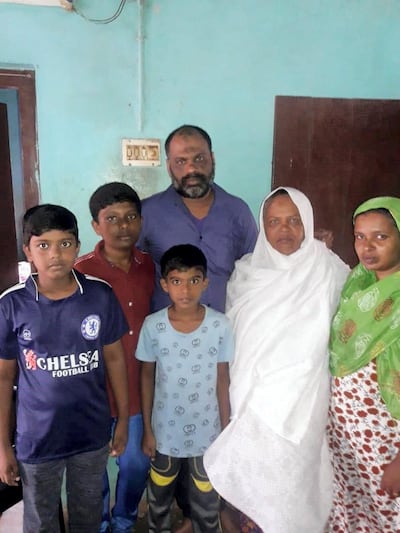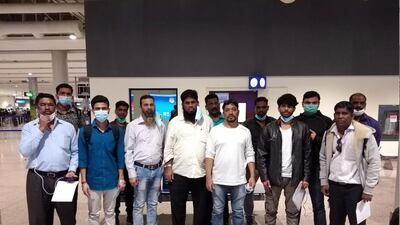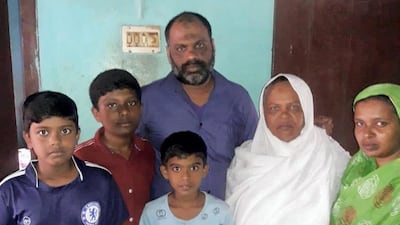Fourteen Indian sailors who were held captive by Houthi rebels in Yemen have described their harrowing ordeal in interviews with The National.
The sailors survived 10 months of fear and misery, during which bombs exploded near the building where they were being held as prisoners.
The men said they were given only khuboos, the Middle Eastern bread, to eat for months before the intervention of the Indian embassy in Djibouti, who negotiated their release on November 28. The released captives were flown to Dubai on Sunday and then to India to be reunited with their families.
They treated us like animals and threw food at us. We thought we would die there
The crew were detained by the Houthis on February 14 when three ships en route to Saudi Arabia from Oman strayed into Yemeni waters in rough weather.
“They treated us like animals and threw food at us,” said Mohanraj Thanigachalam, a chief engineer who was among the group locked in five rooms in a hotel in Sanaa, Yemen’s capital.
"They would come into our room with khuboos and guns."
The sailors could hear bombs exploding near the hotel, he said.
"We thought we would die there. Every day we cried and asked them what we had done wrong," he said.
"All of us have families and we worried because we had not sent money home for 10 months.”
The nightmare began for Mr Thanigachalam, when his ship, the Danah-6, sank on February 12 in a storm.
Two ships, the Al Rahyah and Farida, rescued the men. Some had jumped overboard to survive.
But a few days later, they came under fire from Houthi rebels who boarded the vessels and took the crew to Hodeidah port.
Mr Thanigachalam thought he would never see his wife and young children again.
“I thought I would die. We tried to pump water out of the engine room but it kept gushing in and we had to abandon the ship. I was in the water, there was so much wind and the waves were so high,” said the 36-year-old from his home in Cuddalore, a town in southern Tamil Nadu state in India.
“We were rescued but, after two days, men in boats started shooting at us. It was hundreds of bullets, they kept shouting at us. When we realised they were Houthis, we were very distressed.”
The Iran-backed Houthis – who according to reports are set to be designated a terrorist group by the Trump administration – seized the ships' documents, crew passports and belongings and held them captive.
Guards were stationed outside a barred steel door leading to their rooms at the Sanaa hotel.
The men were not allowed to leave except for questioning by security officials.
They were given their mobile phones after two months but allowed only five-minute calls every two weeks.
The sailors contacted their family, Indian officials and the media in their hometowns over the next few months.
They survived on dry bread until the intervention of Indian officials in Sanaa and Djibouti.
“For seven months we ate khuboos and sometimes beans. Even during Ramadan, they gave us only dry bread,” Mr Thanigachalam said.
“After the Indian embassy visits, they started treating us better and we got some food to eat in the last two months.”
Abdul Musthaba, a chief officer, who was reunited with his family in Thiruvananthapuram, Kerala, on Monday afternoon, vividly remembers the bombs.
“We were always scared. We could hear and feel the bombs. We worried, ‘What if a bomb hit our building?’ We thought there was no hope," he said.
He used the short phone calls to urge his family to remind people about their situation.
“What can you talk about in five minutes. My family would cry and I would cry,” the 43-year-old said.
The men were taken to a court and told they had been sentenced to one year in prison because they entered Yemeni waters without permission.
Sustained negotiation by Indian government officials with the Houthis, and the efforts of their families and social workers to make their plight known helped secure their release.
A Dubai businessman sent funds to their families in India for daily expenses.
The men travelled from Aden to Djibouti, transited via Dubai and reached India on Monday afternoon.
Mr Thanigachalam was relieved to be home but anxious since the crew were not paid during captivity.
Their employer in Oman has said wages would be paid once the insurance settlement is cleared.
Mr Thanigachalam’s worries have intensified because his five-year-old daughter requires constant medical care after a heart surgery last year.
“I’m very excited to see my children. First, I want to spend some time with my family but then I must look for a job,” he said.
“I don’t even have a passport. I have a bank loan to pay. All of us are in deep trouble without our salaries.”
October's Yemen prisoner swap - in pictures
What is an FTO Designation?
FTO designations impose immigration restrictions on members of the organisation simply by virtue of their membership and triggers a criminal prohibition on knowingly providing material support or resources to the designated organisation as well as asset freezes.
It is a crime for a person in the United States or subject to the jurisdiction of the United States to knowingly provide “material support or resources” to or receive military-type training from or on behalf of a designated FTO.
Representatives and members of a designated FTO, if they are aliens, are inadmissible to and, in certain circumstances removable from, the United States.
Except as authorised by the Secretary of the Treasury, any US financial institution that becomes aware that it has possession of or control over funds in which an FTO or its agent has an interest must retain possession of or control over the funds and report the funds to the Treasury Department.
Source: US Department of State
The years Ramadan fell in May
The years Ramadan fell in May
The five pillars of Islam
1. Fasting
2. Prayer
3. Hajj
4. Shahada
5. Zakat
Mohammed bin Zayed Majlis
More from Neighbourhood Watch
UAE currency: the story behind the money in your pockets
Shooting Ghosts: A U.S. Marine, a Combat Photographer, and Their Journey Back from War by Thomas J. Brennan and Finbarr O’Reilly
12%20restaurants%20opening%20at%20the%20hotel%20this%20month
%3Cp%3EAriana%E2%80%99s%20Persian%20Kitchen%3Cbr%3EDinner%20by%20Heston%20Blumenthal%3Cbr%3EEstiatorio%20Milos%3Cbr%3EHouse%20of%20Desserts%3Cbr%3EJaleo%20by%20Jose%20Andres%3Cbr%3ELa%20Mar%3Cbr%3ELing%20Ling%3Cbr%3ELittle%20Venice%20Cake%20Company%3Cbr%3EMalibu%2090265%3Cbr%3ENobu%20by%20the%20Beach%3Cbr%3EResonance%20by%20Heston%20Blumenthal%3Cbr%3EThe%20Royal%20Tearoom%C2%A0%3C%2Fp%3E%0A
Company%20Profile
%3Cp%3E%3Cstrong%3EName%3A%3C%2Fstrong%3E%20HyveGeo%3Cbr%3E%3Cstrong%3EStarted%3A%3C%2Fstrong%3E%202023%3Cbr%3E%3Cstrong%3EFounders%3A%3C%2Fstrong%3E%20Abdulaziz%20bin%20Redha%2C%20Dr%20Samsurin%20Welch%2C%20Eva%20Morales%20and%20Dr%20Harjit%20Singh%3Cbr%3E%3Cstrong%3EBased%3A%20%3C%2Fstrong%3ECambridge%20and%20Dubai%3Cbr%3E%3Cstrong%3ENumber%20of%20employees%3A%3C%2Fstrong%3E%208%3Cbr%3E%3Cstrong%3EIndustry%3A%20%3C%2Fstrong%3ESustainability%20%26amp%3B%20Environment%3Cbr%3E%3Cstrong%3EFunding%3A%20%3C%2Fstrong%3E%24200%2C000%20plus%20undisclosed%20grant%3Cbr%3E%3Cstrong%3EInvestors%3A%20%3C%2Fstrong%3EVenture%20capital%20and%20government%3C%2Fp%3E%0A
Dengue%20fever%20symptoms
%3Cp%3EHigh%20fever%20(40%C2%B0C%2F104%C2%B0F)%3Cbr%3ESevere%20headache%3Cbr%3EPain%20behind%20the%20eyes%3Cbr%3EMuscle%20and%20joint%20pains%3Cbr%3ENausea%3Cbr%3EVomiting%3Cbr%3ESwollen%20glands%3Cbr%3ERash%26nbsp%3B%3C%2Fp%3E%0A
More from Rashmee Roshan Lall
The Voice of Hind Rajab
Starring: Saja Kilani, Clara Khoury, Motaz Malhees
Director: Kaouther Ben Hania
Rating: 4/5
More coverage from the Future Forum
UAE currency: the story behind the money in your pockets
THE BIO
Bio Box
Role Model: Sheikh Zayed, God bless his soul
Favorite book: Zayed Biography of the leader
Favorite quote: To be or not to be, that is the question, from William Shakespeare's Hamlet
Favorite food: seafood
Favorite place to travel: Lebanon
Favorite movie: Braveheart
Killing of Qassem Suleimani
UAE currency: the story behind the money in your pockets
Recent winners
2002 Giselle Khoury (Colombia)
2004 Nathalie Nasralla (France)
2005 Catherine Abboud (Oceania)
2007 Grace Bijjani (Mexico)
2008 Carina El-Keddissi (Brazil)
2009 Sara Mansour (Brazil)
2010 Daniella Rahme (Australia)
2011 Maria Farah (Canada)
2012 Cynthia Moukarzel (Kuwait)
2013 Layla Yarak (Australia)
2014 Lia Saad (UAE)
2015 Cynthia Farah (Australia)
2016 Yosmely Massaad (Venezuela)
2017 Dima Safi (Ivory Coast)
2018 Rachel Younan (Australia)
Company%20profile
%3Cp%3E%3Cstrong%3EName%3A%20%3C%2Fstrong%3EMaly%20Tech%3Cbr%3E%3Cstrong%3EStarted%3A%3C%2Fstrong%3E%202023%3Cbr%3E%3Cstrong%3EFounder%3A%3C%2Fstrong%3E%20Mo%20Ibrahim%3Cbr%3E%3Cstrong%3EBased%3A%3C%2Fstrong%3E%20Dubai%20International%20Financial%20Centre%3Cbr%3E%3Cstrong%3ESector%3A%3C%2Fstrong%3E%20FinTech%3Cbr%3E%3Cstrong%3EFunds%20raised%3A%3C%2Fstrong%3E%20%241.6%20million%3Cbr%3E%3Cstrong%3ECurrent%20number%20of%20staff%3A%3C%2Fstrong%3E%2015%3Cbr%3E%3Cstrong%3EInvestment%20stage%3A%20%3C%2Fstrong%3EPre-seed%2C%20planning%20first%20seed%20round%3Cbr%3E%3Cstrong%3EInvestors%3A%3C%2Fstrong%3E%20GCC-based%20angel%20investors%3C%2Fp%3E%0A
Red flags
- Promises of high, fixed or 'guaranteed' returns.
- Unregulated structured products or complex investments often used to bypass traditional safeguards.
- Lack of clear information, vague language, no access to audited financials.
- Overseas companies targeting investors in other jurisdictions - this can make legal recovery difficult.
- Hard-selling tactics - creating urgency, offering 'exclusive' deals.
Courtesy: Carol Glynn, founder of Conscious Finance Coaching
















